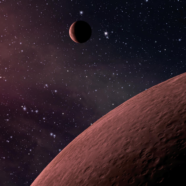
The Chianti Topics International Focus Workshop is an extraordinary opportunity for experts in a selected field to meet and discuss in the beauty of the Chianti hills and a unique chance for an in-depth study of a topic for young researchers. The 4th edition of the Chianti Topics will be held in San Donato in Poggio, Italy from 25-27th March 2020 and is organized by Università di Firenze and Istituto Nazionale di Astrofisica (INAF). The workshop will offer an up-to-date view of planetary atmosphere research and Solar System planetary analogues and models. Researchers are invited to discuss their recent results in this frontier field, giving highlights of future projects and research.
Topics:
- Planets, Moons and Exoplanets: Surfaces, Atmospheres and Exospheres
- Photochemistry and star-planet, moon-planet interactions
- Analogues of planetary atmospheres and environments
- Laboratory experiments on biospheres and biosignatures in planetary atmospheres
This workshop is one of several focused workshops, with at least 50 participants, most of them students, that every year will tackle and explore a specific item in different scientific topics. The workshop will last 3 days; speakers are invited to attend the workshop full time to discuss and share their expertise with the other participants. Sessions are composed of 45/30 minutes talks followed by 10-15 minutes for questions and discussion. At the end of the workshop a round table on the selected topic will be organized.
After twenty years of both ground and space based observations a lot of planets around stars have been identified. The most striking characteristic of these new worlds is their wide differentiation: hundreds of hot and cold jupiters, neptunes and super earths with a wide range of masses and radii not existing in our Solar System. For a handful of exoplanets we could also investigate their atmospheric composition through spectra of low and medium resolution in both combined light and spatially resolved spectroscopy. The latter started with dedicated integral field units on VLT (SPHERE) and Gemini (GPI). With these instruments we have been able to find and characterize mostly young planets and feature several molecular species. Thanks to these observations, molecules such as water vapour, methane, carbon monoxide and dioxide have been discovered for the first time in the atmosphere of an exoplanet.
In the near future the spectral characterization of the atmosphere of exoplanets will move the fringe between a mere knowledge of the existence of extrasolar planets to the study of the physics of these low mass companions. The interpretation of molecular spectra of even simple molecules proves to be incredibly complex, due to a variety of quantum effects, only part of them being tractable.
Theoretical models and laboratory experiments simulating planetary atmospheres aim at understanding the atmospheric properties from hot jupiters to habitable rocky planets. The laboratory experiments can provide insights on the interaction between the planetary environment and the atmosphere. Photochemistry, outgassing, escape processes and “life”, all concur to modify the chemical content of the atmosphere.
SOC:
- Angela Ciaravella (INAF, Palermo Astronomical Observatory),
- Elena Pettinelli (3rd University of Rome),
- Giuseppe Piccioni (INAF, IAPS Roma),
- Olivia Venot (CNRS, LISA, Université Paris Est Créteil),
- Jean-Pierre Paul de Vera (DLR Berlin),
- Riccardo Claudi (INAF, Padova Astronomical Observatory) (chair)
- Emanuele Pace (University of Firenze) (co-chair)
Invited speakers:
- Mickael Baquè (DLR Berlin)
- Barbara Cosciotti (3rd University of Rome)
- John Lee Grenfell (DLR Berlin)
- Nicoletta La Rocca (DiBio University of Padova)
- Marcel Snels (CNR_ISAC)
- Giovanni Vladilo (INAF Trieste)
Register to Attend
To register visit http://chiantitopics.it/fee-an-registration
Abstracts should be sent in a free format to info@chiantitopics.it no later than 10 February 2020.
Title, authors with affiliations, a short description (max. 2000 characters including spaces) and the corresponding author should be specified in the abstract page. For more information visit http://chiantitopics.it

